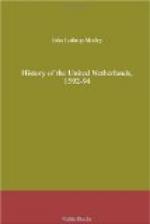Title: History of the United Netherlands, 1592
Author: John Lothrop Motley
Release Date: January, 2004 [EBook #4864] [Yes, we are more than one year ahead of schedule] [This file was first posted on April 9, 2002]
Edition: 10
Language: English
Character set encoding: ASCII
*** Start of the project gutenberg EBOOK history united Netherlands, 1592 ***
This eBook was produced by David Widger widger@cecomet.net
[Note: There is a short list of bookmarks, or pointers, at the end of the file for those who may wish to sample the author’s ideas before making an entire meal of them. D.W.]
HISTORY OF THE UNITED NETHERLANDS From the Death of William the Silent to the Twelve Year’s Truce—1609
By John Lothrop Motley
MOTLEY’S HISTORY OF THE NETHERLANDS, Project Gutenberg Edition, Vol. 64
History of the United Netherlands, 1592
CHAPTER XXVI.
Return of Prince Maurice to the siege of Steenwyck—Capitulation of the besieged—Effects of the introduction of mining operations— Maurice besieges Coeworden—Verdugo attempts to relieve the city, but fails—The city capitulates, and Prince Maurice retreats into winter quarters.
While Farnese had thus been strengthening the bulwarks of Philip’s universal monarchy in that portion of his proposed French dominions which looked towards England, there had been opportunity for Prince Maurice to make an assault upon the Frisian defences of this vast realm. It was difficult to make half Europe into one great Spanish fortification, guarding its every bastion and every point of the curtain, without far more extensive armaments than the “Great King,” as the Leaguers proposed that Philip should entitle himself, had ever had at his disposal. It might be a colossal scheme to stretch the rod of empire over so large a portion of the earth, but the dwarfish attempts to carry the design into execution hardly reveal the hand of genius. It is astonishing to contemplate the meagre numbers and the slender funds with which this world-empire was to be asserted and maintained. The armies arrayed at any important point hardly exceeded a modern division or two; while the resources furnished for a year would hardly pay in later days for a few weeks’ campaign.
When Alexander, the first commander of his time, moved out of Flanders into France with less than twenty thousand men, he left most vital portions of his master’s hereditary dominions so utterly unprotected that it was possible to attack them with a handful of troops. The young disciple of Simon Stevinus now resumed that practical demonstration of his principles which had been in the previous year so well begun.




